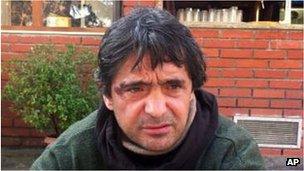Albania ex-dissident dies after self-immolation protest
- Published

An Albanian former political prisoner who set himself on fire in protest at delays in government compensation for communist-era dissidents has died.
Lirak Bejko, 47, had been taken to a hospital in Bari, Italy after setting himself on fire on 10 October.
He was one of 20 former dissidents who began a hunger strike over the compensation issue in September.
The government refused to talk to the protesters, saying that their action was politically motivated.
Before his death, Mr Bejko - who suffered burns on 50% of his body - told an interviewer in hospital that he wanted his fellow dissidents to continue their protest but not to follow his example, Reuters news agency reports.
"I love them very much. I do not want them to feel my pains. They are atrocious, it is like meat roasting," he said.
'Desperate acts'
Under a law passed in 2007, Albania's former political prisoners are entitled to compensation of 2,000 lek (£11.50; $19) for every day that they spent in prison.
The hunger strikers in the capital, Tirana, had accused the government of failing to deliver that entitlement.
Skender Tufa, head of the association of former political prisoners, said Mr Bejko's self-immolation, and that of fellow ex-dissident Gjergj Ndreca, were "desperate acts" by people he described as "walking corpses, deprived of any dignity".
The hunger strike was called off after some of the participants became severely weakened.
Tens of thousands of people were executed or imprisoned in labour camps during the decades-long communist rule of Stalinist leader Enver Hoxha.
- Published28 June 2023
- Published23 July 2004